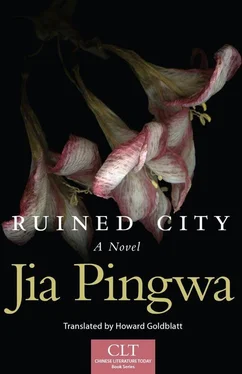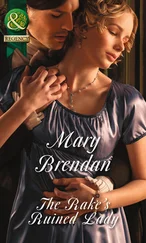Niu Yueqing, who was leaning blankly against the wall, suddenly roused herself. “What was that?”
“This is his sheet now, so you need to pay five yuan at the inpatient department.”
They pushed the gurney out; with badly aligned wheels, it wobbled and creaked along the way. Zhuang turned to look as the gurney came down the brightly lit staircase, like a steel slab dragged out of a furnace, or a cartful of crystal from the crystal palace in a fairy tale. The gurney went down three flights of low steps, carrying a round object that rolled from side to side, like a watermelon enclosed in a sack.
. . .
The Department of Culture took care of Zhong’s funeral arrangements. Being unaffiliated with the department, Zhuang and others could only learn from Zhou Min what was done and make some suggestions. Zhong’s wife, her mentally handicapped son in tow, went to the hospital morgue, where she pulled back the sheet for a quick look, then went outside to burn spirit money and have the son smash the filial son bowl, which contained noodles and paper ashes. Then she began negotiating with the department leadership, demanding five thousand yuan in assistance and a job for her son. That went on for three days, but Zhuang Zhidie and Zhou Min did not inquire about the results. Li Hongwen told her that Zhong had given a case to Zhuang. She asked for it, so he had no choice but to open it and show her a stack of letters. “You see, these are all business letters dealing with the editorial office. Your husband asked me to take care of them. There’s no money in here.”
“So he treasured letters about his job so much that he put them in a case and was still concerned about office business on his deathbed. He didn’t give a damn about me or our son. Where did he spend all his money, anyway? He didn’t leave us anything.” She took the case with her, leaving the letters with Zhuang. He stayed away for a few days, until he heard that the eulogy was finished. He went to the Department of Culture for a copy, which he would read aloud; he made a few changes. People in the office told him not to be too emotional. “Well, then,” he replied sarcastically, “I’ll call together a hundred of our cultural figures for their opinion.” He also drafted an obituary, which he gave to Zhou Min to be published in the newspaper. Zhou came back with the paper’s response: as a party publication, it would only publish obituaries for party cadres above a certain rank. So Zhuang spent the night composing a short memorial essay and had it published in the supplement. More than a hundred people came to the department office with wreaths that day. The eulogy was approved, and it was decided to hold a memorial in the morning and a viewing two days later at the crematorium. Zhuang spent another evening composing the mourning couplets for the memorial site, suffering from a searing headache when he was finished. Meng Yunfang, Zhao Jingwu, Gou Dahai, and Zhou Min came to see him.
“Get word to as many people as possible, so we’ll have a full house,” he told them. “I really need to rest. Here’s a mourning couplet I drafted. I didn’t have time to worry about parallel word usage or a rhyming scheme. Why don’t you take a look to see if I’ve said what needed to be said and make the necessary changes. Then buy a few yards of white gauze, and no matter what else you have to do, make sure to find Gong Jingyuan and ask him to write the couplet on the cloth. Hang it in the compound at the Department of Culture for a day before taking it to the memorial site.”
The others took a look; it was a long couplet:
Do not sigh over the lack of fortune
water lilies look lovely in mud
The trees are capacious and the birds can keep warm
the winter plum bursts into bloom .
Do not laugh at the brevity of life
glowworms scatter in the dying night
The moon is lusterless and the stars hide in the dark
an autumn cicada is losing its voice .
As the others walked off in different directions, Niu Yueqing went to the store to buy black crepe for Zhong’s closest friends to wear at the memorial. Zhuang was still up when she got home. Tang Wan’er was sitting by his bed, while Liu Yue was brewing ginger tea in the kitchen. The moment Niu Yueqing stepped in, Tang lowered her head to dry her tears. “Get some rest, Shimu, so you don’t ruin your health. Without these friends, I’m sure Mr. Zhong’s funeral would be dealt with hastily and casually. Did you see that wife of his? She barely shed a tear; she’s more intent upon filing a grievance. What kind of wife is that?”
“They never got along.”
“Only a ghost could get along with someone like that,” Tang said, unconsciously tugging a corner of the blanket over Zhuang, a sight that stunned Niu Yueqing, who walked up to pull the corner of the blanket out and tuck it back down. Knowing she had overstepped her bounds, Tang awkwardly moved to a chair by the bed. “Back at Tongguan,” she said, “I saw a performance of a funeral chant that went, ‘What’s good about living in this world, for you can die at any time and neither friend nor family knows about it.’ I didn’t quite get the sadness in the chant, but now, after Mr. Zhong’s death, my eyes water whenever I think about it.”
“Weren’t all his friends around when Mr. Zhong died?” Niu Yueqing asked.
“Those were just friends, not the person on his mind.”
“The person on his mind? Who could that be?”
“Wan’er is referring to a school friend from Suzhou, Anhui,” Zhuang said.
“You knew about that?” Niu Yueqing asked Tang.
“I told her.”
She glared at her husband. “You told me not to breathe a word, but you couldn’t keep your mouth shut. Wan’er, everyone thought there was money in Mr. Zhong’s case, but it was in fact filled with love letters that your Zhuang Laoshi wrote to Mr. Zhong pretending to be the schoolmate. You mustn’t tell anyone. It would make Mr. Zhong look bad, not to mention your Zhuang Laoshi.”
“What’s wrong with letting people know now that he’s dead? When the truth is out, people will be impressed by how Mr. Zhong and Zhuang Laoshi fought for true love,” Tang said.
“Of course we all understand Mr. Zhong’s heart, but if it were made known, how many people do you think would be as understanding as we are? He was, after all, a married man. As for love, he and his wife spent a lifetime together and produced that idiot of a son, so how can anyone say there was never any love?”
“Those are two different things. When I think about it at night, I feel sad for Mr. Zhong, but then I don’t. With his gray hair and the beauty in his heart, he had an enviable life, except for the fact that his lover wasn’t real.”
“Would she have dared to come if she had been real?” Niu Yueqing asked.
“Why not?” Tang said. “If it were me and I’d known about his feelings, I’d have come and had a good cry over his body.”
“You? No one can be a match for you,” Niu Yueqing said, and then, sensing the inappropriateness of her words, she added, “I can’t stand all this talk about a lover. A lover is nothing but a prostitute, a whore. Stop talking about this, Wan’er. It’s all right for you talk about it with me, but who knows what kind of trouble we’d have if others knew about it? Liu Yue, isn’t the ginger tea ready yet?”
Feeling disconcerted by Niu Yueqing’s reproach, Tang stood up. “I’ll go look.” She went to the kitchen.
“What are you going to do with the letters?” Niu Yueqing asked her husband. “Should we put them in with Zhong when he’s cremated?”
“There are six from the woman to him and fourteen from him to her, twenty altogether. Each has five to eight thousand words. I’m thinking about writing a long preface and having them published in a volume.”
Читать дальше


![Matthew Vincent - [you] Ruined It for Everyone!](/books/216429/matthew-vincent-you-ruined-it-for-everyone-thumb.webp)









